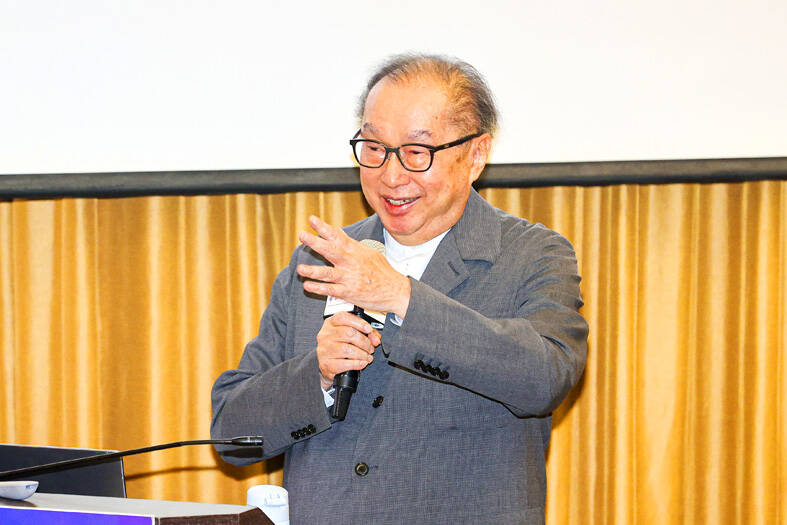Quanta Computer Inc (廣達) chairman Barry Lam (林百里) on Sunday said that customer demand remained steady, with a positive order outlook, despite the US tariff threat.
The company has been ramping up production over the past few months and would strive to overcome disruptions caused by US President Donald Trump’s trade policies, chairman Barry Lam (林百里) said at the company’s 37th anniversary event in New Taipei City’s Linkou District (林口).
Trump imposed a 32 percent “reciprocal” tariff on imports from Taiwan on April 2, although he announced on April 9 that implementation would be delayed by 90 days. However, a universal 10 percent tariff was immediately applied to most imports around the world.

Photo: CNA
Quanta operates nine manufacturing facilities worldwide, demonstrating its operational resilience and ability to provide reliable solutions for customers, Lam said.
The company primarily manufactures servers in the US and Germany, while notebook computers destined for markets outside the US are produced in China, he said.
Notebooks sold within the US are made in Thailand and Vietnam, while automotive electronics are mainly manufactured in Mexico, he added.
“Regardless the location, we can always meet customers’ needs,” Lam said.
Echoing Lam’s remarks, Quanta vice chairman C.C. Leung (梁次震) said the company has expanded its production footprint across multiple countries — including China, Vietnam, Thailand, the US, Mexico and Germany — in response to a shifting international environment, particularly changes brought about by Trump’s tariff policies.
“As Trump changes his stance from day to day, Quanta has been gearing up to maintain a high-level of agility and work harder to cope with the geopolitical situation,” he added.
Lam said that demand from the four leading US cloud service providers (CSPs) — Amazon.com Inc, Alphabet Inc, Microsoft Corp and Meta Platforms Inc — remains steady, with orders unchanged.
With these CSPs continuing to invest in data centers and related infrastructure, Quanta has been ramping up production to meet their needs, Lam told reporters on the sidelines of the event.
Artificial intelligence (AI) applications have flourished over the pat few years, with costs falling annually. Although AI still has a long way to go, Lam said he remains optimistic about the sector’s future.
Asked whether he plans to retire at 80, Lam, who turns 76 this year, said there is no definitive answer, adding that his health has been improving as Quanta’s business continues to grow.
However, working purely as an original equipment manufacturer is no longer exciting, and Quanta aims to transform into an independent research and development company, which his team is also enthusiastic about, Lam said.

NEW IDENTITY: Known for its software, India has expanded into hardware, with its semiconductor industry growing from US$38bn in 2023 to US$45bn to US$50bn India on Saturday inaugurated its first semiconductor assembly and test facility, a milestone in the government’s push to reduce dependence on foreign chipmakers and stake a claim in a sector dominated by China. Indian Prime Minister Narendra Modi opened US firm Micron Technology Inc’s semiconductor assembly, test and packaging unit in his home state of Gujarat, hailing the “dawn of a new era” for India’s technology ambitions. “When young Indians look back in the future, they will see this decade as the turning point in our tech future,” Modi told the event, which was broadcast on his YouTube channel. The plant would convert

‘SEISMIC SHIFT’: The researcher forecast there would be about 1.1 billion mobile shipments this year, down from 1.26 billion the prior year and erasing years of gains The global smartphone market is expected to contract 12.9 percent this year due to the unprecedented memorychip shortage, marking “a crisis like no other,” researcher International Data Corp (IDC) said. The new forecast, a dramatic revision down from earlier estimates, gives the latest accounting of the ongoing memory crunch that is affecting every corner of the electronics industry. The demand for advanced memory to power artificial intelligence (AI) tasks has drained global supply until well into next year and jeopardizes the business model of many smartphone makers. IDC forecast about 1.1 billion mobile shipments this year, down from 1.26 billion the prior

People stand in a Pokemon store in Tokyo on Thursday. One of the world highest-grossing franchises is celebrated its 30th anniversary yesterday.

Zimbabwe’s ban on raw lithium exports is forcing Chinese miners to rethink their strategy, speeding up plans to process the metal locally instead of shipping it to China’s vast rechargeable battery industry. The country is Africa’s largest lithium producer and has one of the world’s largest reserves, according to the US Geological Survey (USGS). Zimbabwe already banned the export of lithium ore in 2022 and last year announced it would halt exports of lithium concentrates from January next year. However, on Wednesday it imposed the ban with immediate effect, leaving unclear what the lithium mining sector would do in the